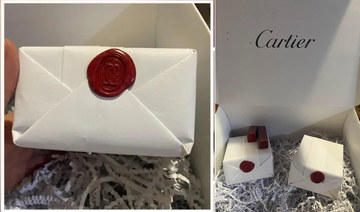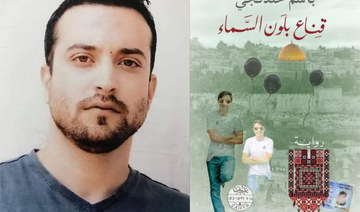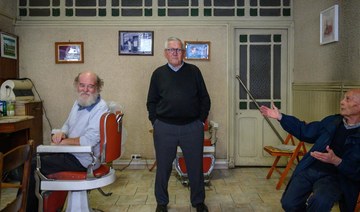LOS ANGELES: Actress Uma Thurman, who is indelibly linked to Harvey Weinstein’s Miramax studio thanks to her iconic roles in “Pulp Fiction” and “Kill Bill,” has broken her silence about the disgraced Hollywood mogul, accusing him of attacking her and threatening her career.
Dozens of Hollywood women — including Ashley Judd, Gwyneth Paltrow, Kate Beckinsale and Salma Hayek — have accused Weinstein of acts ranging from sexual harassment to rape.
The scandal has touched off a deluge of allegations bringing down powerful men in entertainment, politics and the media, forcing many industries to re-examine workplace harassment policies.
Thurman, 47, told The New York Times in an interview published Saturday of two incidents in London that took place after the release of 1994’s Oscar-winning “Pulp Fiction.”
They followed an uncomfortable episode at a Paris hotel in which Thurman said Weinstein was dressed in a bathrobe and led her into a steam room during a meeting about a script.
In the first “attack,” which took place in Weinstein’s suite at London’s Savoy Hotel, “he pushed me down. He tried to shove himself on me. He tried to expose himself. He did all kinds of unpleasant things,” she said.
“But he didn’t actually put his back into it and force me. You’re like an animal wriggling away, like a lizard. I was doing anything I could to get the train back on the track. My track. Not his track.”
A statement from Weinstein’s publicist quoted in the Times read: “Mr Weinstein acknowledges making a pass at Ms Thurman in England after misreading her signals in Paris. He immediately apologized.”
Thurman said she took a friend with her to confront Weinstein not long after that first incident. But his assistants pressured her to meet him alone in his room.
Thurman said she told Weinstein: “If you do what you did to me to other people you will lose your career, your reputation and your family, I promise you.”
Weinstein told the paper “she very well could have said this.”
Thurman’s friend Ilona Herman, who is Robert De Niro’s longtime makeup artist, recalled in the Times that the actress came out of that one-on-one meeting “very disheveled and so upset and had this blank look.”
Herman said Thurman told her that Weinstein had threatened to end her career.
Weinstein denied doing so and called Thurman “a brilliant actress.” He noted, in his comments to the Times, they had “a flirtatious and fun working relationship” until the Paris incident.
Weinstein, who like other men accused of misconduct has been banished from the entertainment industry, is reportedly in treatment for sexual addiction. Until now, he has insisted all his sexual encounters have been consensual.
Thurman had suggested mistreatment by Weinstein in an Instagram post last November, in which she said she was “angry.”
“Harvey, and all your wicked conspirators — I’m glad it’s going slowly — you don’t deserve a bullet — stay tuned,” she said at the time.
In the Times interview, Thurman also accused director Quentin Tarantino — who has often referred to her as his “muse” — of forcing her to drive an unsafe car during filming of “Kill Bill,” leading to a serious crash.
In footage posted by the Times, the actress is seen speeding down an unpaved road before crashing into a tree. Thurman is jolted sickeningly and left dazed for several moments until crew members carry her away.
“I felt this searing pain and thought, ‘Oh my God, I’m never going to walk again,’” she said. “When I came back from the hospital in a neck brace with my knees damaged and a large massive egg on my head and a concussion, I wanted to see the car and I was very upset.
“Quentin and I had an enormous fight, and I accused him of trying to kill me.”
Tarantino did not respond to requests by the Times for comment.
Miramax told her at the time that she could see the footage of the crash if she gave up her right to sue, she said. She declined.
“When they turned on me after the accident,” she said, “I went from being a creative contributor and performer to being like a broken tool.”
Thurman said she has complex feelings about her experiences, on the one hand as a victim but on the other as an enabler.
“The complicated feeling I have about Harvey is how bad I feel about all the women that were attacked after I was,” she told the Times.
“I am one of the reasons that a young girl would walk into his room alone, the way I did. Quentin used Harvey as the executive producer of ‘Kill Bill,’ a movie that symbolizes female empowerment. And all these lambs walked into slaughter because they were convinced nobody rises to such a position who would do something illegal to you, but they do.”
Uma Thurman breaks silence on Harvey Weinstein
Uma Thurman breaks silence on Harvey Weinstein

A 98-year-old in Ukraine walked miles to safety from Russians, with slippers and a cane
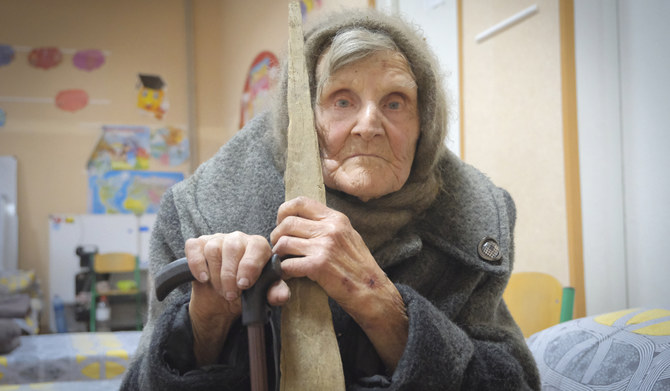
- Describing her journey, the nonagenarian said she had fallen twice and was forced to stop to rest at some points, even sleeping along the way before waking up and continuing her journey
KYIV, Ukraine: A 98-year-old woman in Ukraine who escaped Russian-occupied territory by walking almost 10 kilometers (6 miles) alone, wearing a pair of slippers and supported by a cane has been reunited with her family days after they were separated while fleeing to safety.
Lidia Stepanivna Lomikovska and her family decided to leave the frontline town of Ocheretyne, in the eastern Donetsk region, last week after Russian troops entered it and fighting intensified.
Russians have been advancing in the area, pounding Kyiv’s depleted, ammunition-deprived forces with artillery, drones and bombs.
“I woke up surrounded by shooting all around — so scary,” Lomikovska said in a video interview posted by the National Police of Donetsk region.
In the chaos of the departure, Lomikovska became separated from her son and two daughters-in-law, including one, Olha Lomikovska, injured by shrapnel days earlier. The younger family members took to back routes, but Lydia wanted to stay on the main road.
With a cane in one hand and steadying herself using a splintered piece of wood in the other, the pensioner walked all day without food and water to reach Ukrainian lines.
Describing her journey, the nonagenarian said she had fallen twice and was forced to stop to rest at some points, even sleeping along the way before waking up and continuing her journey.
“Once I lost balance and fell into weeds. I fell asleep … a little, and continued walking. And then, for the second time, again, I fell. But then I got up and thought to myself: “I need to keep walking, bit by bit,’” Lomikovska said.
Pavlo Diachenko, acting spokesman for the National Police of Ukraine in the Donetsk region, said Lomikovska was saved when Ukrainian soldiers spotted her walking along the road in the evening. They handed her over to the “White Angels,” a police group that evacuates citizens living on the front line, who then took her to a shelter for evacuees and contacted her relatives.
“I survived that war,’ she said referring to World War II. “I had to go through this war too, and in the end, I am left with nothing.
“That war wasn’t like this one. I saw that war. Not a single house burned down. But now – everything is on fire,” she said to her rescuer.
In the latest twist to the story, the chief executive of one of Ukraine’s largest banks announced on his Telegram channel Tuesday that the bank would purchase a house for the pensioner.
“Monobank will buy Lydia Stepanivna a house and she will surely live in it until the moment when this abomination disappears from our land,” Oleh Horokhovskyi said.
Amazon Purr-rime: Cat accidentally shipped to online retailer

- Galena was found safe by a warehouse worker at an Amazon center after vanishing from her home in Utah
LOS ANGELES: A curious cat that sneaked into an open box was shipped across the United States to an Amazon warehouse after its unknowing owners sealed it inside.
Carrie Clark’s pet, Galena, vanished from her Utah home on April 10, sparking a furious search that involved plastering “missing” posters around the neighborhood.
But a week later, a vet hundreds of miles (kilometers) away in Los Angeles got in touch to say the cat had been discovered in a box — alongside several pairs of boots — by a warehouse worker at an Amazon center.
“I ran to tell my husband that Galena was found and we broke down upon realizing that she must have jumped into an oversized box that we shipped out the previous Wednesday,” Clark told KSL TV in Salt Lake City.
“The box was a ‘try before you buy,’ and filled with steel-toed work boots.”
Clark and her husband jetted to Los Angeles, where they discovered Amazon employee Brandy Hunter had rescued Galena — a little hungry and thirsty after six days in a cardboard box, but otherwise unharmed.
“I could tell she belonged to someone by the way she was behaving,” said Hunter, according to Amazon.
“I took her home that night and went to the vet the next day to have her checked for a microchip, and the rest is history.”
What did people eat before agriculture? New study offers insight
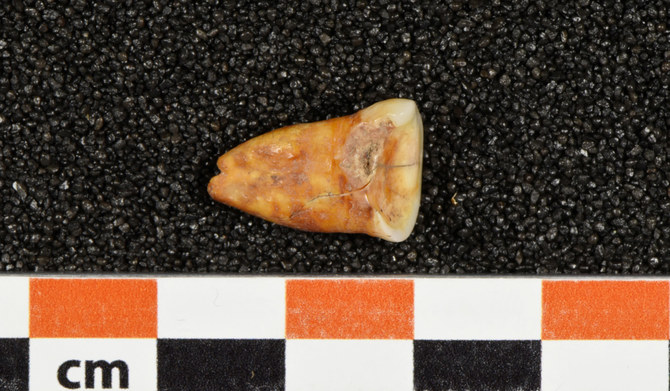
- Analysis of forms — or isotopes — of elements including carbon, nitrogen, zinc, sulfur and strontium in these remains indicated the type and amount of plants and meat they ate
WASHINGTON: The advent of agriculture roughly 11,500 years ago in the Middle East was a milestone for humankind — a revolution in diet and lifestyle that moved beyond the way hunter-gatherers had existed since Homo sapiens arose more than 300,000 years ago in Africa.
While the scarcity of well-preserved human remains from the period preceding this turning point has made the diet of pre-agricultural people a bit of a mystery, new research is now providing insight into this question. Scientists reconstructed the dietary practices of one such culture from North Africa, surprisingly documenting a heavily plant-based diet.
The researchers examined chemical signatures in bones and teeth from the remains of seven people, as well as various isolated teeth, from about 15,000 years ago found in a cave outside the village of Taforalt in northeastern Morocco. The people were part of what is called the Iberomaurusian culture.
Analysis of forms — or isotopes — of elements including carbon, nitrogen, zinc, sulfur and strontium in these remains indicated the type and amount of plants and meat they ate. Found at the site were remains from different edible wild plants including sweet acorns, pine nuts, pistachio, oats and legumes called pulses. The main prey, based on bones discovered at the cave, was a species called Barbary sheep.
“The prevailing notion has been that hunter-gatherers’ diets were primarily composed of animal proteins. However, the evidence from Taforalt demonstrates that plants constituted a big part of the hunter-gatherers’ menu,” said Zineb Moubtahij, a doctoral student in archaeology at the Max Planck Institute for Evolutionary Anthropology in Germany and lead author of the study published on Monday in the journal Nature Ecology & Evolution.
“It is important as it suggests that possibly several populations in the world already started to include substantial amount of plants in their diet” in the period before agriculture was developed, added archeogeochemist and study co-author Klervia Jaouen of the French research agency CNRS.
The Iberomaurusians were hunter-gatherers who inhabited parts of Morocco and Libya from around 25,000 to 11,000 years ago. Evidence indicates the cave served as a living space and burial site.
These people used the cave for significant portions of each year, suggesting a lifestyle more sedentary than simply roaming the landscape searching for resources, the researchers said. They exploited wild plants that ripened at different seasons of the year, while their dental cavities illustrated a reliance on starchy botanical species.
Edible plants may have been stored by the hunter-gatherers year-round to guard against seasonal shortages of prey and ensure a regular food supply, the researchers said.
These people ate only wild plants, the researchers found. The Iberomaurusians never developed agriculture, which came relatively late to North Africa.
“Interestingly, our findings showed minimal evidence of seafood or freshwater food consumption among these ancient groups. Additionally, it seems that these humans may have introduced wild plants into the diets of their infants at an earlier stage than previously believed,” Moubtahij said.
“Specifically, we focused on the transition from breastfeeding to solid foods in infants. Breast milk has a unique isotopic signature, distinct from the isotopic composition of solid foods typically consumed by adults.”
Two infants were among the seven people whose remains were studied. By comparing the chemical composition of an infant’s tooth, formed during the breastfeeding period, with the composition of bone tissue, which reflects the diet shortly before death, the researchers discerned changes in the baby’s diet over time. The evidence indicated the introduction of solid foods at around the age of 12 months, with babies weaned earlier than expected for a pre-agricultural society.
North Africa is a key region for studying Homo sapiens evolution and dispersal out of Africa.
“Understanding why some hunter-gatherer groups transitioned to agriculture while others did not can provide valuable insights into the drivers of agricultural innovation and the factors that influenced human societies’ decisions to adopt new subsistence strategies,” Moubtahij said.
Palestinian prisoner in Israel wins top fiction prize

- The mask in the novel’s title refers to the blue identity card that Nur, an archaeologist living in a refugee camp in Ramallah, finds in the pocket of an old coat belonging to an Israeli
ABU DHABI: Palestinian writer Basim Khandaqji, jailed 20 years ago in Israel, won a prestigious prize for Arabic fiction on Sunday for his novel “A Mask, the Color of the Sky.”
The award of the 2024 International Prize for Arabic Fiction was announced at a ceremony in Abu Dhabi.
The prize was accepted on Khandaqji’s behalf by Rana Idriss, owner of Dar Al-Adab, the book’s Lebanon-based publisher.
Khandaqji was born in the Israeli-occupied West Bank city of Nablus in 1983, and wrote short stories until his arrest in 2004 at the age of 21.
He was convicted and jailed on charges relating to a deadly bombing in Tel Aviv, and completed his university education from inside jail via the Internet.
The mask in the novel’s title refers to the blue identity card that Nur, an archaeologist living in a refugee camp in Ramallah, finds in the pocket of an old coat belonging to an Israeli.
Khandaqji’s book was chosen from 133 works submitted to the competition.
Nabil Suleiman, who chaired the jury, said the novel “dissects a complex, bitter reality of family fragmentation, displacement, genocide, and racism.”
Since being jailed Khandaqji has written poetry collections including “Rituals of the First Time” and “The Breath of a Nocturnal Poem.”
He has also written three earlier novels.
Mexican doctor claims victory in $28 Cartier earrings battle

MEXICO CITY: A Mexican man has claimed a victory over French luxury brand Cartier, saying an error allowed him to buy two pairs of earrings for $28 that were supposed to cost nearly $28,000.
After a four-month struggle, doctor Rogelio Villarreal said he had finally received the jewelry, which he accused the company of refusing to deliver after his online purchase in December.
According to Villarreal, he came across the low-priced earrings while browsing Instagram.
“I swear I broke out in a cold sweat,” he wrote on the social media platform X.
Cartier declined to recognize the purchase and offered Villarreal a refund, as well as a bottle of champagne and a passport holder as compensation, according to a company letter shared by the doctor.
But Villarreal refused and decided to take the case to Mexico’s consumer protection agency, which ruled in favor of the doctor.
Cartier accepted the decision, Villarreal announced.
“War is over. Cartier is complying,” he wrote.




